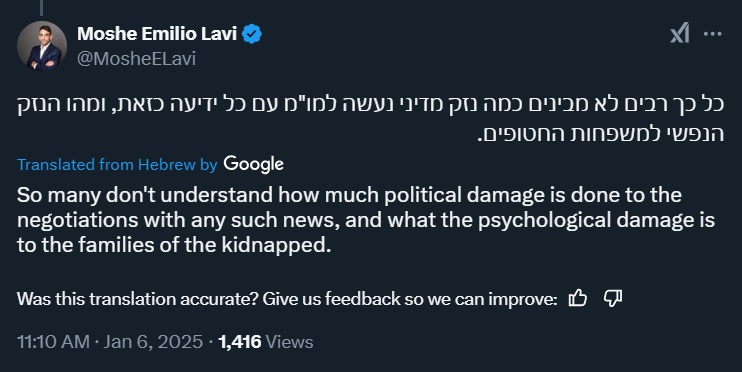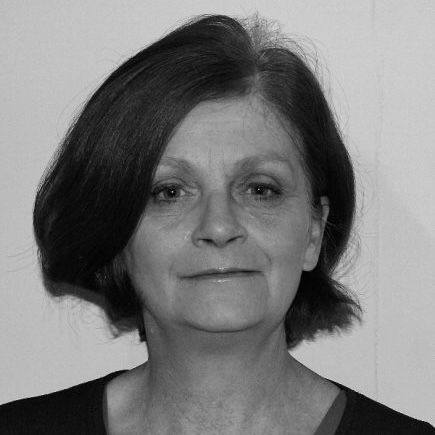BBC News website promotes Hamas psychological warfare

Early on the morning of January 6th the BBC News website published a report headlined ‘Hamas lists 34 hostages it may free under ceasefire’. Originally listed as have being written by “senior journalist Middle East” Naomi Scherbel-Ball and Patrick Jackson, that report was later updated to add Rushdi Abualouf to its credits.
The report – which, notably, does not at any point inform BBC audiences how many hostages are still held by terrorist organisations in the Gaza Strip – begins by telling readers that: [emphasis added]
“A senior Hamas official has shared with the BBC a list of 34 hostages that the Palestinian group says it is willing to release in the first stage of a potential ceasefire agreement with Israel.”
Those who recall Rushdi Abualouf’s participation in a “mourning ceremony in Doha” for a Hamas leader in August 2024 may not have been surprised to see that when that proscribed terrorist organisation wants to wage psychological warfare, it turns to the BBC.
The BBC’s editorial guidelines on ‘War, Terror and Emergencies’ include a list of mandatory referrals concerning contact with terrorist organisations. One of those causes reads as follows:
“11.2.6 Any proposal to approach an organisation (or an individual member of an organisation) designated a ‘terrorist group’ by the Home Secretary under the Terrorism Acts, and any proposal to approach individuals or organisations responsible for acts of terror, to participate in our output must be referred in advance to Director Editorial Policy and Standards.”
Hamas of course is “designated a ‘terrorist group’ by the Home Secretary under the Terrorism Acts”, meaning that contact between “a senior Hamas official” and any journalist employed by the BBC should have been approved by David Jordan.
However, BBC audiences have no way of knowing whether or not such a referral was made or what were the reasons for the Director’s approval (if granted) because the BBC does not exercise transparency on such matters. As CAMERA UK noted in its recent submission to the BBC’s consultation on a revised draft of the Editorial Guidelines:
“For full transparency, the standards according to which such approvals are granted should be made public and such an item should be marked as having been approved.”
Notably, the BBC’s report states:
“Hamas’s decision to release the names of hostages will be seen by some as an attempt to increase public pressure on the Israeli government.”
In other words, if David Jordan did indeed approve this contact with an unidentified “senior Hamas official”, he did so knowing that the BBC was collaborating with a proscribed terrorist organisation’s propaganda campaign.
Some four hours after its initial publication, this report was amended to add a statement from Israel’s PMO. [emphasis added]
“The Israeli prime minister’s office denied reports that Hamas had provided Israel with a list of hostages.
“The list of abductees published in the media was not passed on to Israel by Hamas, but was originally passed from Israel to intermediaries as early as July 2024,” it said.
“To date, Israel has not received any confirmation or comment from Hamas regarding the status of the abductees on the list.””
That statement in fact uses the term hostages rather than “abductees”.
On the morning of January 6th the Hostages and Missing Families Forum put out a statement concerning the list which is the topic of the BBC’s story.
“The families of the hostages are shaken and upset by the list published this morning,” the forum says. “We call on the media and the public to show sensitivity and responsibility regarding the publication of this and other such things until a deal is signed, and also during it.”
“The time is ripe for a comprehensive agreement that will return all the hostages – the living for healing, and the murdered and fallen for a proper burial. We are leaving no one behind!”
As noted by one family member:

Nevertheless, some six and a half hours after its initial publication, the BBC decided to put out an amended version of this report – credited to Raffi Berg and Rushdi Abualouf with “[a]dditional reporting by Naomi Scherbel-Ball in Jerusalem”– which now includes the 34 names which did not appear in the previous three versions.
Notably, the BBC editorial guidelines mentioned above also include the following:
“We should also consider carefully the ethical issues raised by providing a platform to hijackers, kidnappers or hostage-takers, especially if they make direct contact.”
The BBC’s report was amended a further three times and the version currently appearing online is credited to Naomi Scherbel-Ball and Rushdi Abualouf. Published on the afternoon of January 6th, that version includes a quote from the statement put out by the Hostages and Missing Families Forum earlier in the day which – remarkably – does not include the part about media “sensitivity and responsibility”.
“Families of hostages said in a statement that they were “deeply shaken and distressed” by the list.
“The time has come for a comprehensive agreement that will bring back all hostages – we know more than half are still alive and need immediate rehabilitation, while those who were murdered must be returned for proper burial. We have no more time to waste. A hostage ceasefire agreement must be sealed now!””
The BBC’s reputation as a provider of ‘impartial’ news would benefit were its funding public provided with a transparent account of the circumstances behind the ‘sharing’ of this list by an unnamed “senior Hamas official” and the editorial decision to provide a worldwide platform for that terrorist organisation’s propaganda.

Hadar Sela was born in the north of England and has lived in Israel for over three decades. She has a special interest in the influence of the media on the British public’s perceptions of the Middle East and the Islamist networks operating in the UK and has written pre-emptive reports on several anti-Israel campaigns, including the flotillas and the Global March to Jerusalem in March 2012. Hadar’s work has been published in the Jerusalem Post, The Algemeiner, The Commentator, MERIA Journal and at Harry’s Place, among others.
You might also like to read this:















